In Paris, the Chilean researcher, novelist and feminist Ana (Nicha) Vazquez Bronfman had died, aged 71. She was a beacon for a generation of Latin American women for her insights on identity and gender. One [...]]]>
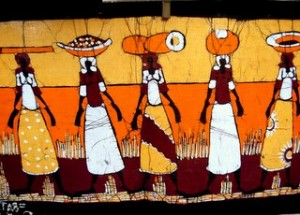
Motherhood, sisterhood, friendship.
In Paris, the Chilean researcher, novelist and feminist Ana (Nicha) Vazquez Bronfman had died, aged 71. She was a beacon for a generation of Latin American women for her insights on identity and gender. One concept she elaborated specially was “transculturation” – the permanent construction of identities in this world of global migration. In 2006 she wrote superbly about sexuality among the elderly – transgressions and secrets, she called it.
In Rome, my friend and fellow journalist Paola Rolletta underwent the next to last chemotherapy session against breast cancer. She was jubilant to see the end of the chemical bombardment. Like antiretrovirals, chemo saves lives but is no picnic.
So, in three hours, youth, disease, health and death touched me. Motherhood and friendship. Joy and sorrow.
Email has made this vertigo possible. News travel quickly and straight to our screens, to our hearts and minds.
News from friends
These days, breast cancer appears more frequently in news from friends.
One in the Dominican Republic and another in Mozambique finished their chemo last year. Paola is finishing hers in February. In Pretoria, where I live, another friend had her second chemo last Friday.
We had lunch together today and wondered if there is more breast cancer among women now than 50 years ago, or better detection. If the rates are higher, why? Lifestyle, fast food, stress, radiation from microwaves, cellphones and all the gadgets that crowd our life?
The Harvard School of Public Health estimates that the poor will account for more than 55 percent of breast cancer deaths this year. Read a very informative story on growing cancer rates among women in the developing world here.
A recent article in the New England Journal of Medicine argues that “western” influences such as changes in diet, less exercise, delayed childbirth, families with fewer children, less breast feeding, and hormone replacement therapy are all thought to increase the risk of breast cancer for women in low-income countries.
The good news is that breast cancer, like AIDS, is becoming less and less lethal, if detected and treated early.
I am so proud of my cancer-survivor friends. They have worn their baldness as a badge of courage and have acquired new wisdom.
And while we age and think about breast cancer, a younger generation moves closer to adulthood.
I wondered how to name and save this rambling text in my laptop. And I wrote – BLOG: LIFE.
]]>I will call her Gabra (gift, in Amharic), for our conversation was private. I met her at a monastery near Lalibela, the mystical city of [...]]]>
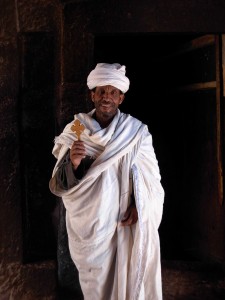
Patriarchal in all senses. By M. Sayagues
What drives a 17-year-old girl to enter a monastery? Today she is 30, and still happy about her choice. Her eyes sparkle and her laughter comes easy. She exudes peace.
I will call her Gabra (gift, in Amharic), for our conversation was private. I met her at a monastery near Lalibela, the mystical city of rock-hewn churches in northern Ethiopia.
Monastic life has a long tradition and prestige in the Ethiopian Orthodox Church. The oldest monastery dates from the 6th century. A monastic renaissance between the 13th and 16th century brought great moral and political authority to clergy.

Custodians of tradition
Gabra’s rock-hewn monastery dates from the 12th century. Her room is excavated in the pink tufa rock. Two built-in-the-rock platforms, covered with a thin mattress, do as couch and bed. An old cupboard holds a few plates and cooking utensils, three of the long green robes worn by Ethiopian peasants, the white headscarves that nuns wear, and two pairs of sandals.
For income, she and her fellow nuns weave cotton and silk into diaphanous shawls, sold at the monastery. She rises before dawn to pray – the first of daily seven prayers. Her ambition is to study theology in Addis Ababa or in Lalibela.
Gabra is not completely cut off from the world. She has a cellphone and a radio. On Sundays, relatives and friends visit.
Choices
I ask her if marriage and children ever interested her.
“It is a privilege to be single and not to have children,” she says softly, smiling but firmly. She sounds relieved.
Unmarried myself, I agree that motherhood and marriage are just one option. I understand the spiritual call, the peace of contemplation and withdrawal, of a simple lifestyle unencumbered by material things.
Yet I wonder if female genital mutilation had to do with her decision.
In Ethiopia’s eastern region, a girl might suffer genital cutting between the age of 15-17, before marriage. Her clitoris would be cut, sometimes the labia.
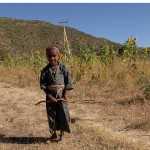
She has a right to her bodily integrity.
In Somali region, she would have infibulation at a younger age: the complete removal of her genitalia and, to preserve virginity, being stitched shut with an acacia thorn, leaving only a hole to urinate.
About three-quarters of women in Ethiopia between 15-49 have suffered some form of genital mutilation, said a government survey of 2005. The practice is fading – but too slowly, say activists.
It is not called mutilation for nothing. Sex and childbirth will be extremely painful and dangerous.
If finding a husband means suffering genital cutting, a hard mattress in a rock-hewn room is a much better place than a king-size wedding bed.
Gabra did not speak English, my male guide spoke little, and sex topics are taboo in Ethiopia, so the conversation went in another direction. Gabra was curious about my life, my work, and my daughter. 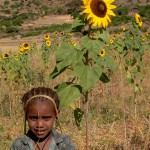
“Would you want to live like me?” she asked. “I don’t think I could,” I said. “But I feel the beauty of this simplicity.” She smiled.
Ethiopia looks and feels ancient and spiritual. Social cohesion is remarkable. But the same lifestyle that makes ferenji (foreigner, in Amharic) wax lyrical about the “biblical landscape and people” binds women to painful and dangerous traditions.
Some traditions are simply annoying. Women cannot join the rites if they are menstruating, ergo unclean. At no time of the month can women, local or foreign, enter the most sacred chapel of the Lalibela complex, Bete Mikael, where King Lalibela is buried. We are only allowed a glimpse from the door. In some monasteries, no females, including of the animal kingdom, are allowed.
Monastery visitors take leave at 5 PM (international time; in Ethiopian time, 11 in the night). I make my way down the stony path, the tufa rock glowing pink and gold in the sunset.
I am thinking that the monastery – the spiritual world – may be a blessed refuge from the hardship of being born female in a deeply patriarchal world.
Read recent IPS stories about genital cutting in Uganda, Sierra Leone and cross-border in West Africa.
]]>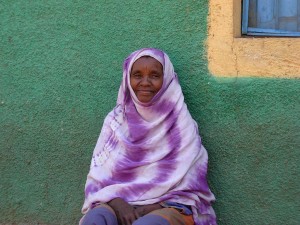
Women manage family health in Ethiopia.
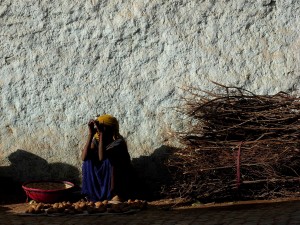
Pics by M. Sayagues
This was not an ordinary polio vaccination day for the children of Babile and Kombolcha, small towns about 500 km East of Addis Ababa. Ferenjis (foreigners in Amharic) [...]]]>
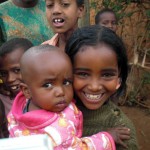
By Gifti Nadi
This was not an ordinary polio vaccination day for the children of Babile and Kombolcha, small towns about 500 km East of Addis Ababa. Ferenjis (foreigners in Amharic) had arrived!
About 100 Rotarians from the USA and Canada paid their way to Harar and Dire Dawa in Eastern Ethiopia to join local health workers in a massive drive to vaccinate 11.5 million children under five nationwide.
In recent years, 24 cases of polio have been detected in Ethiopia, likely coming from Sudan, says the World Health Organisation.
We travelled in small groups to the towns nestled against the backdrop of stunning mountains. We went door to door and were warmly welcomed by the primarily Muslim, Oromo and Somali families.
Last year, a survey showed that 70 per cent of mothers know about polio’s dreadful consequences and the benefits of vaccination, thanks to the work of dedicated community health workers.
Still, some believe that the vaccine might hurt the kids, so it was good to see the women coming forward.
Away from kitchen and kids
Note the word – women. It was 100 per cent women who brought their kids for vaccination, with the exception of one helpful young man. When a woman lied about not having any children, he convinced her to bring her kid out.
Otherwise, the men were either invisible (out in the town) or chilling out chewing chat (a mild narcotic that is legal), away from women, kitchen and kids.
Only once, in a mostly Somali village, a couple of older men came and asked us what we were doing. Just the Ferenjis in yellow shirts made them curious, I think.
Cheers for the women! They knew what the two little drops meant – a life free of polio for their children. One by one, they brought out their charming little ones while we took turns giving them the drops.
This never took place without a fight. Screams of terror and attempts to escape and spit out the drops were common, a natural reaction to being suddenly bombarded by strangers in yellow shirts.
The pictures tell all. Those under the age of 4 have a suspicious frown while their older siblings smile widely.
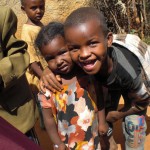
By Gifti Nadi
As we moved from home to home, the crowd grew larger. The playful kids practiced their English, held our hands and warmed our hearts. This was surely a life changing experience and a first for many on this trip.
I was blown away by the dedication and contagious spirit of mothers, community health workers and Rotarians. It was an honor to play a part in a global initiative to eradicate polio from this earth.
*The polio vaccination drive is part of a US$200 million Rotary International Campaign and matching pledges of US$355 from the Bill and Melinda Gates Foundation.
]]>http://www.campaignforrealbeauty.ca/bblank.asp?id=6895
Digital cosmetic surgery – nip-and-tuck, botox and liposuction, on the screen, with a click – render these models picture-perfect (excuse the pun) and thoroughly unreal.
There [...]]]>
http://www.campaignforrealbeauty.ca/bblank.asp?id=6895
Digital cosmetic surgery – nip-and-tuck, botox and liposuction, on the screen, with a click – render these models picture-perfect (excuse the pun) and thoroughly unreal.
There is no way a non-photoshopped woman can attain that perfection. Hey, we are human. We have flaws.
In France and the UK, women lawmakers recently proposed that ads should disclose when their photos have been digitally manipulated to a great extent. They argue that bodily digital perfection in ads undermines the body image and self-esteem of girls and women.
Anorexia, bulimia, eating disorders, obsession with thinness and unnecessary cosmetic surgery follow. Meanwhile, sales of weight-loss products and push-up bras soar.
The tricky problem for lawmakers and advertisers alike is where to draw the line between (acceptable) touching up a pimple or a wrinkle and engaging in full (unacceptable) deception.
Among the most egregious offenders: the French magazine Paris Match nipped the bulging love handles of President Nicholas Sarkozy, in evidence while he canoed bare-chested in the USA.
Oprah Winfrey always has a waist in the cover of O magazine, while flat-chested Keira Knightley miraculously acquired big boobs for her recent Chanel Mademoiselle perfume ad.
The alcoholic drink Campari must have some magical effects on bones because actress Jessica Alba got sharper collarbone and knee definition, longer arms and a tinier waist in its recent ad.
Eating disorders once afflicted mostly affluent white teen girls in the West. Now they have spread across the world, among all ages and ethnic groups and, increasingly, among young men.
It is harder to quantify how the unreal perfect bodies in ads distort the self-image of girls and boys worldwide.
Watch the video and share your thoughts about the proposed disclosure measures.
]]>Instead of striking a balance between ambition and realism, the MDGs have become [...]]]>
Instead of striking a balance between ambition and realism, the MDGs have become “money-metric and donor-centric”, “meaningless catch-all phrases.”
So says Jan Vandemoortele, a Belgian national, a United Nations senior official and one of the architects of the MDGs, in a thought-provoking article in the July issue of Development Policy Review of the Overseas Development Institute. (read it here)
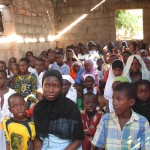
Unrealistic goal? A crowded classroom in Guinea Bissau...
The author recalls that the MDGs were set up in 2000 as collective targets based on extrapolations of global trends. They are vague by definition; they are not one-size-fits-all.
Instead, one should look at countries’ historical backgrounds, natural endowments and specific problems, then adapt the Goals to each circumstance, as Mozambique, Cambodia and Ethiopia have done.
Otherwise, this puts undue pressure on the poorest countries and, given that most of these are in Africa, nurtures Afro-pessimism.
For example, the global target for education “is not realistic” for countries in conflict, he says.
True, targets do change. For example, water for all in 2015 morphed into the more feasible goal of halving the number of people without clean water.
Magic numbers
A mantra has evolved: if only there were more money and higher economic growth, the MDGs would be achieved. Who is fond of these “magic numbers”? Staff at global headquarters of aid organisations, says the author, because of their “excessive reliance on abstract concepts.” (he should know, with his long career as a top UN official).
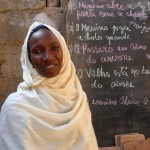
..and their teacher. By M. Sayagues
Vandemoortele sees the MDG canon being usurped by interest groups to push their agendas or devalued “as a repackaged call for more foreign aid.”
Rather, the MDG should be a tool to examine disparities and inequities within countries. In his view, the poorest people continue to be excluded. Many of these are women. Without better sex-disaggregated data, the gender dimension of hunger, illiteracy, disease and poverty remains unexposed.
Most progress takes place among the better off, and inequality and inequity keep rising, says the author.
“The targets are often presented as a universal good that will not demand tough policy choices and hard trade-offs among social groups within a country,” he says.
The MDGs should usher in new thinking about inequalities if they are not to miss the point
What do you think? Send us your views.
]]>I was very pregnant and very happy. I lived in Rome, Italy, and I wanted a home birth.
I wanted music, soft light, friends, baby on my [...]]]>

Safe motherhood for all. By F. Beaumont.
My daughter Esmeralda turns 18 today. Like all parents, I am amazed at how time flies. Like all mothers, I get reminiscent about those days, 18 years ago.
I was very pregnant and very happy. I lived in Rome, Italy, and I wanted a home birth.
I wanted music, soft light, friends, baby on my stomach still attached by umbilical cord, no drugs, and no epidural. A birth by my own rules, not by a cold hospital’s.
I found a group specialized in home births – Il Melograno. Their package included ob-gyn and midwife, courses, support and, more importantly, a woman-friendly feel. A photographer from Marie Claire magazine would do a photo reportage on my happy home birth.
Our premise: pregnancy is neither a disease nor a disability. Pregnancy and birth have become over-medicalized; women should reclaim it from doctors overly fond of control and caesareans. My family, my colleagues and the baby’s father thought I was crazy. Home births are more common now but women still battle to extricate pregnancy and birth out of the hospital realm.
In Brazil, we recently lost a battle for a centre for natural birth in Rio de Janeiro.
Clueless mommy
In my case, at midnight, after 30 hours of labour, I was stuck at 6 cms dilatation – and exhausted. A home birth must be 100 percent natural, so the few drops of oxitocyn to trigger full dilation had to be administered in hospital, three blocks away. There I went. At 2am my daughter was born – and promptly taken away to the nursery.
At 5:30am a nurse literally dumped my baby girl in my arms and left. No instructions on how to feed, nothing. My midwife and friends were coming at 8 am. What to do? I had never been around a newborn. I was like Carrie Bradshaw in Season 2 of Sex and The City – domesticity and motherhood were not part of my landscape.
So there I was, baby on one hand, baby book on the other, trying to figure it out. This is the most ridiculous and pathetic image of modern motherhood, I thought. How did we end here, from birth as a group event to 6 AM loneliness in hospital?
Less than 24 hours later, against hospital rules, I signed waivers absolving doctors of any responsibility and checked myself out.
I went home and turned on the CD player. My daughter’s godmother had been listening to the Rolling Stones: “You can’t always get what you want”. I chuckled.
Two close friends, one in Windhoek and one in London, recently tried a home birth but ended in hospital, just like me. Still, we were happy to go through labour at home.
Meanwhile, many women struggle to have a safe birth – anywhere. About half a million women die in childbirth very year. There are not enough trained midwives to ensure a safe labour, whether at home or at a clinic,

Art by Nelly Romeo Alves, photo by E. Zimbres
At a conference on reproductive health in Berlin last week, the World Health Organisation reported that one woman dies every minute for lack of adequate pregnancy and birth services.
A cruel paradox: the world proffers to revere motherhood but does not make it safe and comfortable for mothers to give birth.
]]>I decided to visit my Nicaraguan friend who stays in a village called Fougamou, in central Gabon. So I looked up the nearest town, Lambaréné. It turned out to have a museum honouring Dr. Albert Schweitzer, who arrived there in 1913, built a hospital, and won a Nobel Peace Prize in 1952.
I [...]]]>

The Ogooué River seen from Dr. Schweitzer's home. Photo: M. Sayagues
I decided to visit my Nicaraguan friend who stays in a village called Fougamou, in central Gabon. So I looked up the nearest town, Lambaréné. It turned out to have a museum honouring Dr. Albert Schweitzer, who arrived there in 1913, built a hospital, and won a Nobel Peace Prize in 1952.
I had never been interested in him but it seemed like a truly off-the-beaten path museum, just my kind. But what sold me on Lambaréné was the name of its river: Ogooué. I HAD to see a river with such a wondrous name.
So I set off to Lambaréné on my way to Fougamou. Believe me, I was in the green heart of Africa. Green, as in rainforest.
I am glad I went. The river is awesome. The museum is charming. It preserves the old hospital and personal quarters from the 1920s as they were originally. Next is the modern hospital, which attends to 80,000 consultations and 6,000 hospitalized patients every year, and continues to practice what I believe was Schweitzer’s most creative medical idea: to welcome the African family, with place to wash, cook and sleep, in a hospital-cum-village.
True, the relatives provided – and still do – free labour. Also true, it is mostly women and girls who provide this free labour. In Gabon and elsewhere, caring for the sick and, increasingly, for the elderly, is women’s work.
In AIDS-ravaged Southern Africa, caring for the sick has put a burden on women and girls that is unthinkable to Western health consumers.
So huge, that the campaign Making Care Work Count lobbies governments for recognition and support of carers – who are subsidizing governments with their work, with little help, making up for woefully inadequate health budgets.
Notwithstanding the gender bias, to include the relatives in hospital design is much better than making them sleep on the street pavement, as I’ve seen in Luanda’s hospitals.
It also reflects a recognition that in Africa medicine must incorporate cultural and social meanings; that it can’t isolate the individual from the collective; that the meaning of disease is part of a bigger reality.
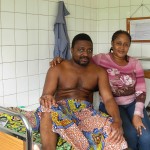
Yeyette and Joel Boko
I travelled from Libreville, 300 kms away, in a taxi-brousse. The first to get in was with Yeyette Boko. She was worried to tears about her husband, Joel Boko, who was in Lambaréné being treated for an ulcerous thigh. He needed a graft. So Yvette had wrestled a two-week leave from her employer to be with him.
She breezed into his room: “Mon chéri, I missed you so much!” They snuggled on the bed and called their four-year-old son, who was staying with an aunt in the capital.
Next day I visited again. Yeyette had cooked a hearty meal. He seemed stronger. They looked happy.
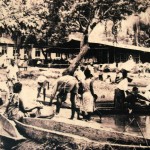
The old landing by the hospital-village.
Read about worldwide efforts to measure and pay women’s unpaid care work
]]>Technorati Profile
Their [...]]]>
Technorati Profile
Their pre-nuptial agreement stipulates that he will spend five days a month with her in her village and the rest with his first wife, who will get 80 per cent of his modest salary.
 The newly weds: a polemic union. Photo:Mukhtar Mai Women’s Welfare Organisation |
Nice sisterhood touch – weird nonetheless. Mai says she married because he was threatening to commit suicide if she didn’t. Her marrying a polygamist dismayed women activists in Pakistan. To me, the mind-boggling issue is the union to an obsessed man. In many countries, that threat would earn him a restraining order and psychotherapy. Here, it earns him a wife.
The heroine who refused to be a victim of her rapists submits to emotional blackmail. Her lawyer says Mai sought an alliance with a man of a powerful tribe, because the trial of her rapists is floundering. On the plus side, that a raped woman finds a husband who cherishes her is groundbreaking in Pakistan.
The truth will emerge sooner rather later, the reasons why this courageous activist, who runs her own NGO and had the support of the women’s movement in Pakistan, who starred in a documentary, wrote a memoir published in English and French, was Glamour magazine’s Woman of the Year and spoke at the United Nations, chose this marriage.
He is clearly smitten with her. She does not mention loving him, only family (his and hers) pressure. I’d like to ask her: do you love him, or think you may grow to love him, or is love for your husband a consideration at all? Maybe not. Romantic love is a social and cultural construct. Arranged marriages can grow strong, respectful and loving bonds among spouses. We wish the newly weds well.
Time will tell if five days a month is enough, too little – or too much.
This curious episode highlights how, for many women across the world, marriage is the only way she can feel safe, respected, provided with a roof over her head. The ways of the heart are mysterious and manifold; so are gender relations.
]]>